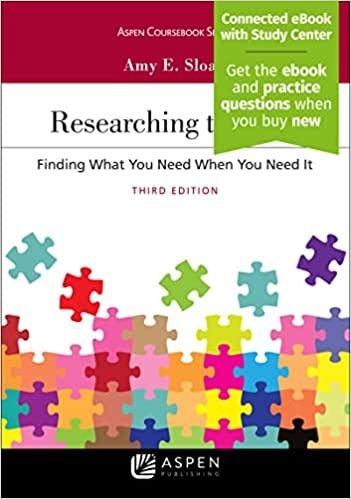Question
The local police department sees an increase in property related crimes in a particular area of town. The area of town is near a rough
The local police department sees an increase in property related crimes in a particular area of town. The area of town is near a "rough" part of the city where property crimes are common. This part of town is also frequented by tourists, which is why the police want to focus on keeping this part of town safe. The police decide to run an operation that is intended to catch thieves in the act of stealing. The design of the operation is as follows:
In the designated area of town experiencing an increase in property crimes are a number of bus stops. The police will leave a bicycle locked to one of the bike racks at one of these particular bus stops. Attached to the bike is a basket attached to the handle bars. In the basket are a number of items including a sealed purse with a wallet inside, a cell phone in the basket but under the purse, a $20 bill tucked into the purse's outside pocket, and the phone's charger also inside the sealed purse along with the aforementioned wallet. (Just glancing at the purse, one would not be able to see the $20 bill. A closer inspection would be required.) An undercover police officer will watch the bike from across the street. Anyone who takes any of the items from the basket, will be arrested by a uniformed police officer one block away waiting to be called to the scene.
The police set-up the above described operation, which lasts several hours. In that time police observe 11 different people inspect and eventually take items from the basket. Police also observe 2 people inspect the basket but leave it alone. of the people who steal -- some take all of the items, while others take only the purse or the phone. Yet some others inspect the items closer and only take the money from the purse. All are arrested and charged with theft. Later, the police note that many of the people who are arrested are transients or homeless people. These cases eventually end up in court.
All the defendants are represented by a defense attorney who takes their cases pro bono (for free). The defense attorney takes the cases because he thinksthe operation is an illegal from of entrapment by the police. The prosecutor then files a motion to prevent the defense attorney from referring to the defendants as either "homeless" or "transient" since these descriptions are not relevant to a theft case. What arguments do you expect the prosecutor to make in support of this motion? What argument do you expect the defense attorney to make if any? Should the defense attorney agree to this motion? Is the prosecutor hurting her own case with this request? What is the judge likely to rule on the prosecutor's motion?
Step by Step Solution
There are 3 Steps involved in it
Step: 1

Get Instant Access to Expert-Tailored Solutions
See step-by-step solutions with expert insights and AI powered tools for academic success
Step: 2

Step: 3

Ace Your Homework with AI
Get the answers you need in no time with our AI-driven, step-by-step assistance
Get Started


